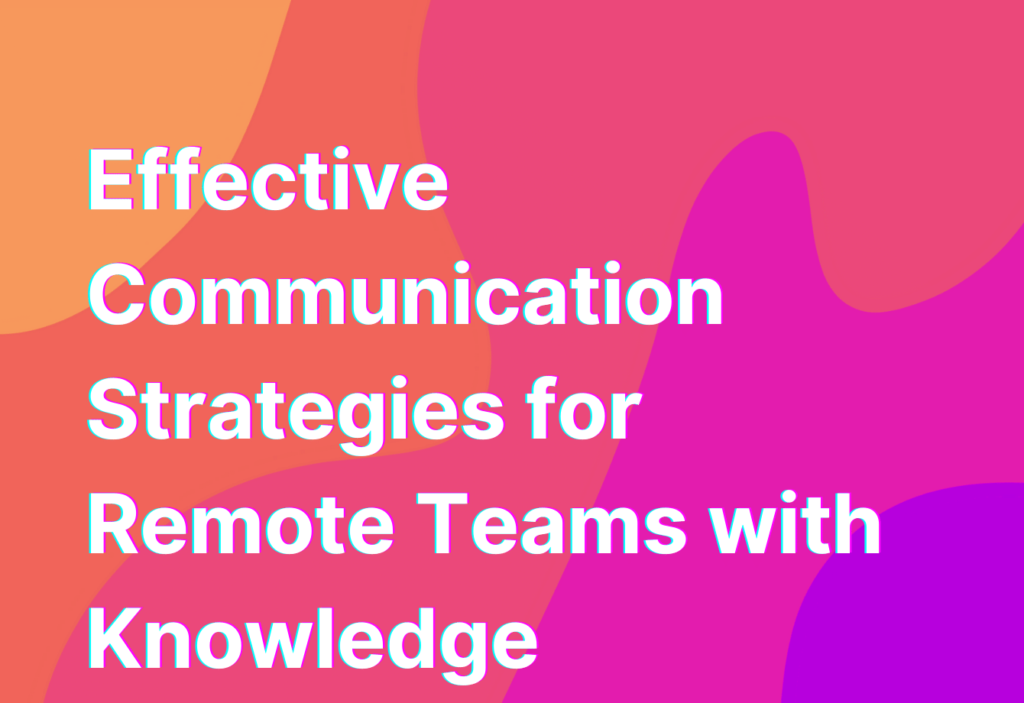Effective Communication Strategies for Remote Teams with Knowledge Management
Hey there, fellow remote workers! Ashley here, your friendly remote work advocate with 10 years of experience in the tech industry. Today, I want to talk about a crucial aspect of remote team success: effective communication strategies with knowledge management. As remote teams become more common, it’s essential to have systems in place that promote collaboration, information sharing, and seamless communication. And that’s where a knowledge management system comes into play.
What is a Knowledge Management System?
Before we dive into the strategies, let’s quickly define what a knowledge management system is. In simple terms, it’s a platform or software that allows teams to capture, organize, and share knowledge within an organization. It’s like having a virtual library where you can store and access important information, documents, and resources.
Now that we’re on the same page, let’s explore some effective communication strategies for remote teams using a knowledge management system:
1. Centralize Information
One of the biggest challenges for remote teams is the scattered nature of information. With team members working from different locations, it’s easy for important documents and resources to get lost in the digital abyss. That’s where a knowledge management system comes in handy. By centralizing all information in one place, team members can easily access what they need, when they need it.
For example, let’s say you’re working on a project and need to access the latest marketing campaign assets. Instead of searching through countless emails or messaging different team members, you can simply log into the knowledge management system and find everything you need in one organized location.
2. Foster Collaboration
Remote work doesn’t mean you have to work in isolation. In fact, effective collaboration is key to remote team success. A knowledge management system can facilitate collaboration by providing a platform for team members to share ideas, ask questions, and provide feedback.
Imagine this: You’re working on a new product launch, and you have a brilliant idea for a marketing campaign. Instead of waiting for the next team meeting to share your idea, you can post it on the knowledge management system and get instant feedback from your teammates. This not only saves time but also encourages a culture of collaboration and innovation.
3. Enhance Communication
Communication is the lifeblood of any team, and remote teams are no exception. In fact, effective communication becomes even more crucial when team members are not physically present in the same location. A knowledge management system can enhance communication by providing various channels for team members to connect and share information.
For instance, you can use the system’s chat feature for quick updates and informal conversations, while important announcements and project updates can be shared through the system’s newsfeed or bulletin board. By having different communication channels within the knowledge management system, remote teams can stay connected and informed.
4. Promote Learning and Development
Remote work offers a unique opportunity for continuous learning and development. With a knowledge management system, team members can access training materials, tutorials, and resources to enhance their skills and knowledge.
Let’s say you want to improve your project management skills. Instead of searching the internet for relevant resources, you can simply browse the knowledge management system’s learning section, where you’ll find a curated list of project management courses, articles, and videos. This not only saves time but also ensures that team members have access to high-quality learning materials.
5. Ensure Accessibility and Security
Last but not least, a knowledge management system ensures that information is accessible to team members while maintaining security and confidentiality. With proper access controls and permissions, you can control who can view, edit, and share sensitive information.
For example, if you’re working on a confidential client project, you can restrict access to only the team members involved in that project. This way, you can ensure that sensitive information remains secure while still allowing collaboration and information sharing within the team.
Wrapping Up
And there you have it, folks! Effective communication strategies for remote teams with knowledge management. By centralizing information, fostering collaboration, enhancing communication, promoting learning and development, and ensuring accessibility and security, remote teams can thrive and achieve their goals.
If you want to learn more about effective remote team communication and leadership development, check out our Leadership Development Program. It’s packed with valuable insights and practical tips to help you become a remote team superstar!
Until next time, keep remote working like a boss!


